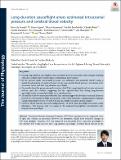Long-duration spaceflight alters estimated intracranial pressure and cerebral blood velocity
Author(s)
Imaduddin, Syed M; Heldt, Thomas
DownloadPublished version (753.5Kb)
Publisher with Creative Commons License
Publisher with Creative Commons License
Creative Commons Attribution
Terms of use
Metadata
Show full item recordAbstract
Persistently elevated intracranial pressure (ICP) above upright values is a suspected cause of optic disc oedema in astronauts. However, no systematic studies have evaluated changes in ICP from preflight. Therefore, ICP was estimated non-invasively before and after spaceflight to test whether ICP would increase after long-duration spaceflight. Cerebral blood velocity in the middle cerebral artery (MCAv) was obtained by transcranial Doppler sonography and arterial pressure in the radial artery was obtained by tonometry, in the supine and sitting positions before and after 4−12 months of spaceflight in 11 astronauts (10 males and 1 female, 46 ± 7 years old at launch). Non-invasive ICP (nICP) was computed using a validated model-based estimation method. Mean MCAv increased significantly after spaceflight (ANOVA, P = 0.007). Haemoglobin decreased significantly after spaceflight (14.6 ± 0.8 to 13.3 ± 0.7 g/dL, P < 0.001). A repeated measures correlation analysis indicated a negative correlation between haemoglobin and mean MCAv (r = −0.589, regression coefficient = −4.68). The nICP did not change significantly after spaceflight in the 11 astronauts. However, nICP decreased significantly by 15% in nine astronauts without optic disc oedema (P < 0.005). Only one astronaut increased nICP to relatively high levels after spaceflight. Contrary to our hypothesis, nICP did not increase after long-duration spaceflight in the vast majority (>90%) of astronauts, suggesting that the cephalad fluid shift during spaceflight does not systematically or consistently elevate postflight ICP in astronauts. Independently of nICP and ocular alterations, the present results of mean MCAv suggest that long-duration spaceflight may increase cerebral blood flow, possibly due to reduced haemoglobin concentration.
Date issued
2020-10Department
Massachusetts Institute of Technology. Department of Electrical Engineering and Computer Science; Massachusetts Institute of Technology. Institute for Medical Engineering & ScienceJournal
Journal of Physiology
Publisher
Wiley
Citation
Iwasaki, Ken-ichi et al. “Long-duration spaceflight alters estimated intracranial pressure and cerebral blood velocity.” Journal of Physiology (October 2020): 1-15 © 2020 The Author(s)
Version: Final published version
ISSN
0022-3751